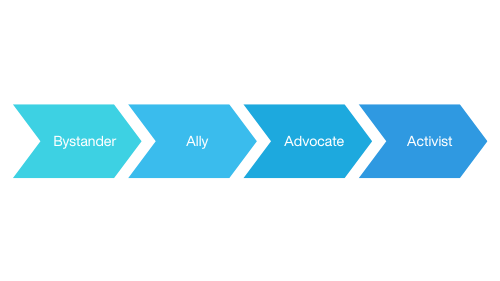Ever wonder why ally, advocate, and activist feel so interchangeable? They each describe the acts an individual takes to support minority groups. Yet, they are used like buzzwords rather than definitive labels. This article will break down each term to understand its definitions, similarities, and differences to develop better workplace communities.
What’s the Difference Between Ally, Advocate, and Activist?
By definition alone, these terms are virtually the same. An ally is “a person or group that provides assistance and support in an ongoing effort, activity, or struggle,” and an advocate is “one who supports or promotes the interests of a cause or group.”
However, the level of support an ally gives vs an advocate vs an activist is different. For example, imagine the local public school is putting on a bake sale to raise money for charity.
The ally would attend the bake sale with their friends and family, buy a few things, and post about it on social media.
The advocate would be someone selling the baked goods. They may have connected to other bakers and helped set up the event.
The activist is the person who organized the event. They would help decide where the money would be donated, invite the bakers, find rental tables, and order decorations.
Each played a part in making the bake sale a success. Remember diversity, equity, and inclusion is not a competition. Whether you bought a baked good or organized the event, the key is that it happened. Real support is a consistent effort to do more for the community.
From Ally to Activist: The Awareness Journey
Instead of considering an ally, advocate, and activist as three separate people, they are more of a progression of awareness dependent on ability. We all start as bystanders. Each marginalized community has unique issues, and while many intersect, we are only sometimes aware of their impact.
Something may trigger your awareness, possibly a protest, personal experience, book or artwork, etc. You will begin to notice something is wrong and pursue information. The more you learn, the more invested you become in fixing the problem. The learning process may push you out of your comfort zone as you start to participate in controversial situations. Over time, you learn how to use your voice and privileges to advocate where others can’t. You may be a member of several ERGs or non-profits at the front of a movement.
Money, time, and access are just a few barriers preventing individuals from growing. For instance, everyone is not a C-suite decision-maker for the company. Barriers may limit ability, but they do not restrict one’s passion or pursuit of equality.

Examples of Allyship, Advocacy, and Activism in the Workplace
Now that we delved into the nuances of allies, advocates, and activists, we can consider how they interact in workplace environments. The following lists are examples of each contribution to promoting diversity, equity, and inclusion.
Allyship in the workplace
- Sharing informational resources with others
- Participating in anti-racism, harassment, and other trainings
- Asking and using someone’s preferred pronouns
- Holding others accountable for discriminatory language or actions
Advocates in the workplace
- Sponsoring a minority individual for a promotion
- Offering stretch opportunities in leadership or advanced skills
- Participating in ERG establishment or policy change
- Mentoring minority individuals to support their professional development
Activism in the workplace
- Strategic proactive solutions for long-term inclusion
- Raising awareness of inequality issues in the organization
- Organizing events to discuss DEI in the workplace
- Negotiating for donations or scholarships that support minority communities
Despite the labels of an ally, advocate, or activist, the steps you take to promote belonging in your workplace matter. They push us into a more inclusive future where the possibilities for every individual are endless.
Check out the Professional Diversity Networks diversity recruitment solutions if you are a decision maker. You can change from an advocate to an activist by implementing initiatives that pipeline diverse job seekers into industries they struggle to access. Learn more about PDN’s job board, exclusive partnerships, and career events on our website.